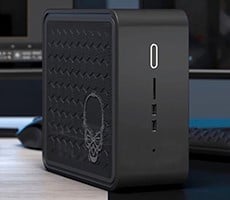Before bringing this article to a close, we'll cover a couple of final data points regarding power consumption and noise output of this machine. Throughout all of our benchmarking and testing, we monitored the Alienware Area-51's acoustics and tracked how much power our test system was consuming at the outlet using a
power meter.
|

|
|
Total System Power Consumption And Acoustics
|
|
Tested at the Outlet
|
|
Our goal was to give you an idea of how much power each configuration used while idling and also while under a heavy workload. Please keep in mind that we were testing total system power consumption at the outlet
.

We measured the wattage draw from this system by running a combination of Prime95 and Furmark, for an extended period of time and then taking note of peak usage. This gives us an idea of a worst case scenario that taxes both the Area-51's Threadripper CPU and
GTX 1080 Ti GPU simultaneously. We noted that, even though our Alienware
Area-51 Threadripper has a lot more CPU cores and the same GPU on board, versus the Origin PC Chronos system, that it really didn't draw that much more power at idle or while loaded down. It's the most power-hungry, single GPU system in our test group, but not by much.
Alienware Area 51 Threadripper Acoustic Profile

We also tracked system noise output with a decibel meter while gaming and under various other workloads. 50dB is typically where we feel things start to get obnoxious but as you can see, while running a few loops of Rise Of The Tomb Raider benchmarks, the system is only putting out about 45dB from about a foot to a foot and a half away. Under our megatasking workload from the previous page, we did witness the Area-51 Threadripper pushing just north of 48dB. In any event, overall, the system remained in check and reasonable thermally and in terms of its acoustics as well.


Dell's Alienware
Area-51 Threadripper Edition starts at $2399 for an 8-core equipped Threadripper 1900X configuration, while Intel entry-level configurations start at $1899 for a 6-core Core i7-7800X variant, and a similarly configured Core i7-7820X 8-core setup at $2529. As tested, with a 256GB SSD, 2TB HDD, GeForce GTX 1080 Ti, Threadripper 1950X 16-core chip, keyboard and mouse, our review system drops in at $3864. These are premium price points to be sure, but when you consider its AiO liquid cooler setup, 1500W gold certified power supply and impressive, user-friendly / accessible, toolless chassis design, we feel the Area-51 represents a solid value with plenty of room for expansion and growth down the line.

Dell's Alienware gaming peripherals are high quality offerings as well, and when coupled with an Alienware desktop, deliver a fully coordinated
RGB-illuminated setup that looks great and trims the total package nicely. We would offer that, if you're considering a Ryzen Threadripper-based system, that high resolution gaming and content creation use cases are better served, versus the high frame rate, 1080p setup of the
Alienware 2518 240Hz G-Sync panel we tested here. Threadripper intrinsically bleeds off a bit of frame rate at low-end resolutions, so if you're intent on keeping triple digit FPS numbers, perhaps an Intel variant would be a better choice.
For the first class, hi-fidelity set, and especially if you like to do ALL the things, all the time, at the same time, the Alienware Area-51 Threadripper Edition is hard to beat, as far as pre-built gaming PCs go. As a gaming PC, this thing shreds 4K gaming like a champ. And as a content creation workstation, it's a complete animal, ready for whatever you can throw at it. Go ahead and try to load this thing down. We did and the Area-51 Threadripper Edition just shrugged it all off; no sweat.

 |
 |
-
Great gaming performance
-
Killer content creation performance
-
Accessible, easily upgradeable chassis
-
Multi-GPU ready chassis and PSU
- Striking good looks
- Innovative chassis design
- Great thermals and acoustics
|
|



 Dell's Alienware Area-51 Threadripper Edition starts at $2399 for an 8-core equipped Threadripper 1900X configuration, while Intel entry-level configurations start at $1899 for a 6-core Core i7-7800X variant, and a similarly configured Core i7-7820X 8-core setup at $2529. As tested, with a 256GB SSD, 2TB HDD, GeForce GTX 1080 Ti, Threadripper 1950X 16-core chip, keyboard and mouse, our review system drops in at $3864. These are premium price points to be sure, but when you consider its AiO liquid cooler setup, 1500W gold certified power supply and impressive, user-friendly / accessible, toolless chassis design, we feel the Area-51 represents a solid value with plenty of room for expansion and growth down the line.
Dell's Alienware Area-51 Threadripper Edition starts at $2399 for an 8-core equipped Threadripper 1900X configuration, while Intel entry-level configurations start at $1899 for a 6-core Core i7-7800X variant, and a similarly configured Core i7-7820X 8-core setup at $2529. As tested, with a 256GB SSD, 2TB HDD, GeForce GTX 1080 Ti, Threadripper 1950X 16-core chip, keyboard and mouse, our review system drops in at $3864. These are premium price points to be sure, but when you consider its AiO liquid cooler setup, 1500W gold certified power supply and impressive, user-friendly / accessible, toolless chassis design, we feel the Area-51 represents a solid value with plenty of room for expansion and growth down the line. 








